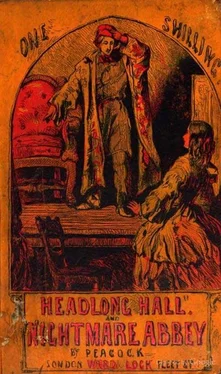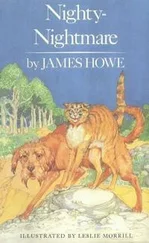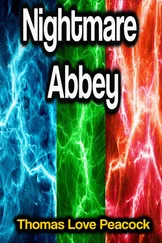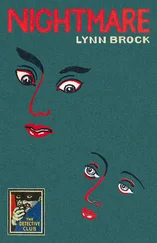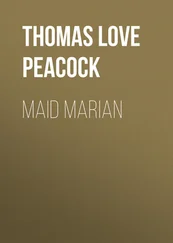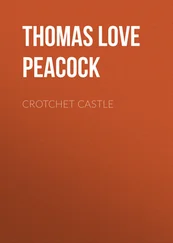Thomas Peacock - Nightmare Abbey
Здесь есть возможность читать онлайн «Thomas Peacock - Nightmare Abbey» весь текст электронной книги совершенно бесплатно (целиком полную версию без сокращений). В некоторых случаях можно слушать аудио, скачать через торрент в формате fb2 и присутствует краткое содержание. Жанр: Классическая проза, Ужасы и Мистика, на английском языке. Описание произведения, (предисловие) а так же отзывы посетителей доступны на портале библиотеки ЛибКат.
- Название:Nightmare Abbey
- Автор:
- Жанр:
- Год:неизвестен
- ISBN:нет данных
- Рейтинг книги:4 / 5. Голосов: 1
-
Избранное:Добавить в избранное
- Отзывы:
-
Ваша оценка:
- 80
- 1
- 2
- 3
- 4
- 5
Nightmare Abbey: краткое содержание, описание и аннотация
Предлагаем к чтению аннотацию, описание, краткое содержание или предисловие (зависит от того, что написал сам автор книги «Nightmare Abbey»). Если вы не нашли необходимую информацию о книге — напишите в комментариях, мы постараемся отыскать её.
Nightmare Abbey — читать онлайн бесплатно полную книгу (весь текст) целиком
Ниже представлен текст книги, разбитый по страницам. Система сохранения места последней прочитанной страницы, позволяет с удобством читать онлайн бесплатно книгу «Nightmare Abbey», без необходимости каждый раз заново искать на чём Вы остановились. Поставьте закладку, и сможете в любой момент перейти на страницу, на которой закончили чтение.
Интервал:
Закладка:
(Mr Flosky suddenly stopped: he found himself unintentionally trespassing within the limits of common sense.)
MR HILARY
It is very true; a happy disposition finds materials of enjoyment every where. In the city, or the country-in society, or in solitude-in the theatre, or the forest-in the hum of the multitude, or in the silence of the mountains, are alike materials of reflection and elements of pleasure. It is one mode of pleasure to listen to the music of 'Don Giovanni,' in a theatre glittering with light, and crowded with elegance and beauty: it is another to glide at sunset over the bosom of a lonely lake, where no sound disturbs the silence but the motion of the boat through the waters. A happy disposition derives pleasure from both, a discontented temper from neither, but is always busy in detecting deficiencies, and feeding dissatisfaction with comparisons. The one gathers all the flowers, the other all the nettles, in its path. The one has the faculty of enjoying every thing, the other of enjoying nothing. The one realises all the pleasure of the present good; the other converts it into pain, by pining after something better, which is only better because it is not present, and which, if it were present, would not be enjoyed. These morbid spirits are in life what professed critics are in literature; they see nothing but faults, because they are predetermined to shut their eyes to beauties. The critic does his utmost to blight genius in its infancy; that which rises in spite of him he will not see; and then he complains of the decline of literature. In like manner, these cankers of society complain of human nature and society, when they have wilfully debarred themselves from all the good they contain, and done their utmost to blight their own happiness and that of all around them. Misanthropy is sometimes the product of disappointed benevolence; but it is more frequently the offspring of overweening and mortified vanity, quarrelling with the world for not being better treated than it deserves.
SCYTHROP (to Marionetta)
These remarks are rather uncharitable. There is great good in human nature, but it is at present ill-conditioned. Ardent spirits cannot but be dissatisfied with things as they are; and, according to their views of the probabilities of amelioration, they will rush into the extremes of either hope or despair-of which the first is enthusiasm, and the second misanthropy; but their sources in this case are the same, as the Severn and the Wye run in different directions, and both rise in Plinlimmon.
MARIONETTA
'And there is salmon in both;' for the resemblance is about as close as that between Macedon and Monmouth.
CHAPTER VIII
Marionetta observed the next day a remarkable perturbation in Scythrop, for which she could not imagine any probable cause. She was willing to believe at first that it had some transient and trifling source, and would pass off in a day or two; but, contrary to this expectation, it daily increased. She was well aware that Scythrop had a strong tendency to the love of mystery, for its own sake; that is to say, he would employ mystery to serve a purpose, but would first choose his purpose by its capability of mystery. He seemed now to have more mystery on his hands than the laws of the system allowed, and to wear his coat of darkness with an air of great discomfort. All her little playful arts lost by degrees much of their power either to irritate or to soothe; and the first perception of her diminished influence produced in her an immediate depression of spirits, and a consequent sadness of demeanour, that rendered her very interesting to Mr Glowry; who, duly considering the improbability of accomplishing his wishes with respect to Miss Toobad (which improbability naturally increased in the diurnal ratio of that young lady's absence), began to reconcile himself by degrees to the idea of Marionetta being his daughter.
Marionetta made many ineffectual attempts to extract from Scythrop the secret of his mystery; and, in despair of drawing it from himself, began to form hopes that she might find a clue to it from Mr Flosky, who was Scythrop's dearest friend, and was more frequently than any other person admitted to his solitary tower. Mr Flosky, however, had ceased to be visible in a morning. He was engaged in the composition of a dismal ballad; and, Marionetta's uneasiness overcoming her scruples of decorum, she determined to seek him in the apartment which he had chosen for his study. She tapped at the door, and at the sound 'Come in,' entered the apartment. It was noon, and the sun was shining in full splendour, much to the annoyance of Mr Flosky, who had obviated the inconvenience by closing the shutters, and drawing the window-curtains. He was sitting at his table by the light of a solitary candle, with a pen in one hand, and a muffineer in the other, with which he occasionally sprinkled salt on the wick, to make it burn blue. He sate with 'his eye in a fine frenzy rolling,' and turned his inspired gaze on Marionetta as if she had been the ghastly ladie of a magical vision; then placed his hand before his eyes, with an appearance of manifest pain-shook his head-withdrew his hand-rubbed his eyes, like a waking man-and said, in a tone of ruefulness most jeremitaylorically pathetic, 'To what am I to attribute this very unexpected pleasure, my dear Miss O'Carroll?'
MARIONETTA
I must apologise for intruding on you, Mr Flosky; but the interest which I-you-take in my cousin Scythrop-
MR FLOSKY
Pardon me, Miss O'Carroll; I do not take any interest in any person or thing on the face of the earth; which sentiment, if you analyse it, you will find to be the quintessence of the most refined philanthropy.
MARIONETTA
I will take it for granted that it is so, Mr Flosky; I am not conversant with metaphysical subtleties, but-
MR FLOSKY
Subtleties! my dear Miss O'Carroll. I am sorry to find you participating in the vulgar error of the _reading public,_ to whom an unusual collocation of words, involving a juxtaposition of antiperistatical ideas, immediately suggests the notion of hyperoxysophistical paradoxology.
MARIONETTA
Indeed, Mr Flosky, it suggests no such notion to me. I have sought you for the purpose of obtaining information.
MR FLOSKY ( shaking his head)
No one ever sought me for such a purpose before.
MARIONETTA
I think, Mr Flosky-that is, I believe-that is, I fancy-that is, I imagine-
MR FLOSKY
The (Greek) toytesti, the id est , the cioè, the c'est à dire, the that is , my dear Miss O'Carroll, is not applicable in this case-if you will permit me to take the liberty of saying so. Think is not synonymous with believe-for belief, in many most important particulars, results from the total absence, the absolute negation of thought, and is thereby the sane and orthodox condition of mind; and thought and belief are both essentially different from fancy, and fancy, again, is distinct from imagination. This distinction between fancy and imagination is one of the most abstruse and important points of metaphysics. I have written seven hundred pages of promise to elucidate it, which promise I shall keep as faithfully as the bank will its promise to pay.
MARIONETTA
I assure you, Mr Flosky, I care no more about metaphysics than I do about the bank; and, if you will condescend to talk to a simple girl in intelligible terms-
MR FLOSKY
Say not condescend! Know you not that you talk to the most humble of men, to one who has buckled on the armour of sanctity, and clothed himself with humility as with a garment?
MARIONETTA
My cousin Scythrop has of late had an air of mystery about him, which gives me great uneasiness.
MR FLOSKY
Читать дальшеИнтервал:
Закладка:
Похожие книги на «Nightmare Abbey»
Представляем Вашему вниманию похожие книги на «Nightmare Abbey» списком для выбора. Мы отобрали схожую по названию и смыслу литературу в надежде предоставить читателям больше вариантов отыскать новые, интересные, ещё непрочитанные произведения.
Обсуждение, отзывы о книге «Nightmare Abbey» и просто собственные мнения читателей. Оставьте ваши комментарии, напишите, что Вы думаете о произведении, его смысле или главных героях. Укажите что конкретно понравилось, а что нет, и почему Вы так считаете.
